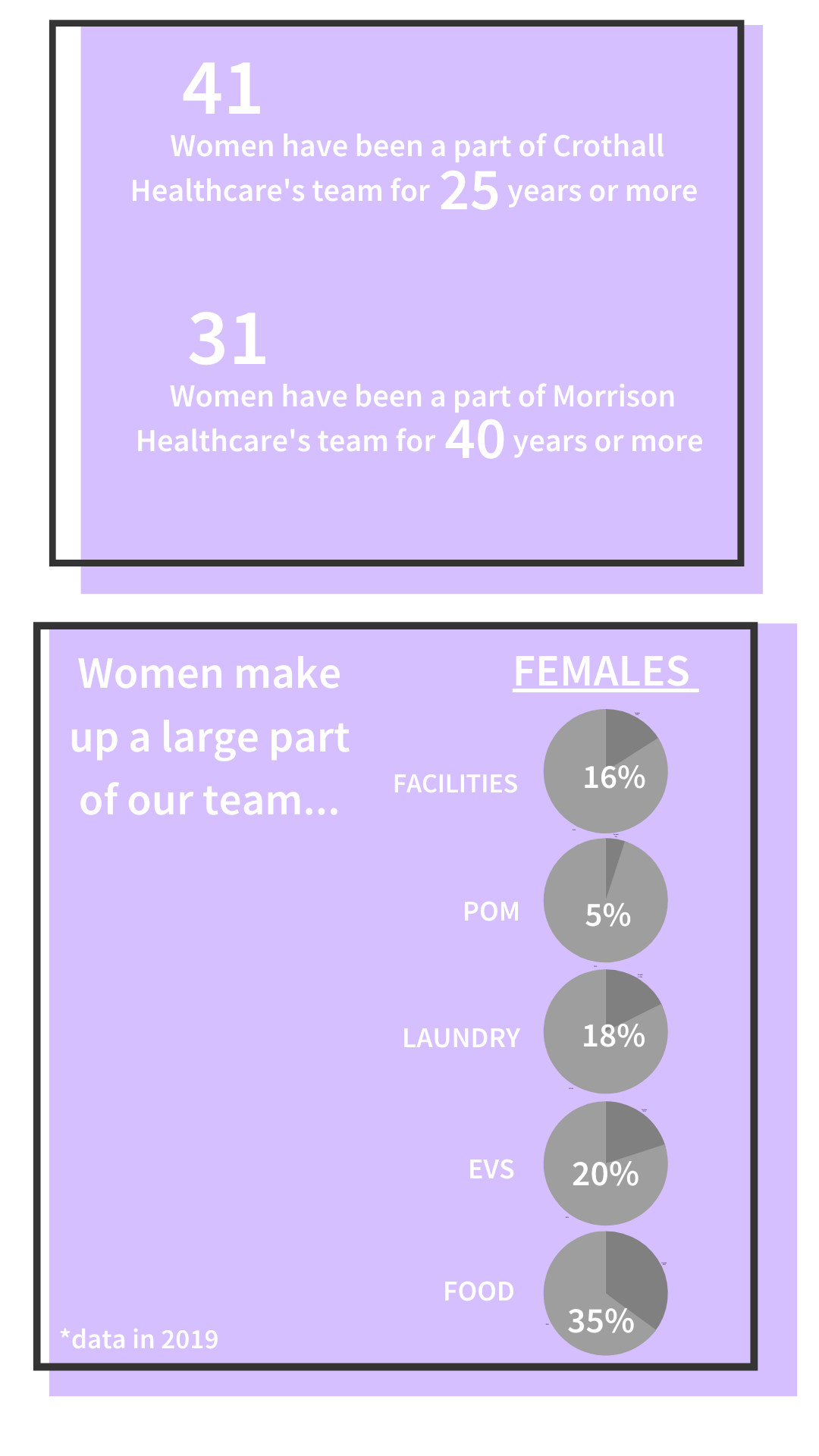Leveling the Playing Field with President of Operational Support Gina Damon
Make International Women’s Day Meaningful with Measurable Change
 Morrison Healthcare’s President of Operational Support Gina Damon was a leader in human resources for more than two decades. You may have heard of some of her previous employers: Goldman Sachs, Bank of America, eBay, and PayPal.
Morrison Healthcare’s President of Operational Support Gina Damon was a leader in human resources for more than two decades. You may have heard of some of her previous employers: Goldman Sachs, Bank of America, eBay, and PayPal.
Looking back on her career, she realizes that getting her professional start in Human Resources put her in a unique role to help shape and drive organizational cultures. And, when you want to realize the goals of International Women’s Day 2020—to take action for equality and forge an enabled, gender-equal world—there is no more effective place from which to make that happen.
She’s learned a few things along the way—with the help of other powerful women and men.
While management in the industries where she previously worked are still heavily male-dominated, HR has long been a department where ambitious women can make inroads. “I had more female role models than if I had been an investment banker or engineer,” says Gina. “I had a healthy mix of male and female mentors. Some people look up and don’t see anyone who looks like them in management. I got to see what was possible because women were running big parts of the company in HR.”
From a very young age, Gina wanted to be self-sufficient, independent. “Starting a career and doing my best was the way to achieve that. Now I have a family that I am protective of and want to provide for, and a daughter for whom I want to be a role model. I hope by the time my daughter enters the workforce, she will have many examples of women in leadership, who give her the confidence that she can not only aspire to, but also achieve the same levels of success.”

She says that the notion of equality can be overwhelming, given how far off we are in some areas. “People might think that what they do won’t make a difference because it’s not grand enough. But the accumulation of all the small things becomes something big, and that’s important.”
We had the pleasure of interviewing Gina about how leaders, both male and female can push women, and companies, to succeed in creating a more gender-equal environment.
Tell us about your journey with Compass Group, and your new role as President of Operational Support at Morrison Healthcare.
I started with Compass One Healthcare in November 2015 as the Senior Vice President of Human Resources. In October 2019, I moved into my current position in Morrison. After spending more than 22 years in human resources, the change was exciting, but definitely pushed me out of my comfort zone. I’m grateful for the people in both my personal and professional life who I was able to lean on for advice and encouragement.
How does Compass Group and Morrison Healthcare create a gender-equal culture?
The company has made visible moves to diversify leadership teams. Dominic Blakemore made a commitment to gender representation as a key priority, and his appointments over the past year back that up.

The fact that we are a performance-based culture is definitely key. Your results are rewarded, not your gender. The new Upward Program developed by Compass, which focuses on Women in Culinary, is another example of what the company is doing to create a culture of opportunity for women. Morrison currently has twelve female chefs enrolled in the inaugural launch of the program.
What are some strategies you’ve used to build opportunities for women? Not just at Compass One and Morrison, but throughout your career.
Some strategies have been data-focused, others are “softer.” For example, at eBay and PayPal, we worked on diagnosing the issue. We wanted to understand why we were balanced and diverse at entry-level positions, in some cases where women were over-performing, but not in management. Where did equality fall off? Was it a hiring issue, a promotion issue, a retention issue? Were our hiring processes not equitable enough? Were our promotion or performance management processes contributing to the problem? By understanding where the opportunities existed, we could modify our processes.
We realized that opportunities were important. So, we asked the women who pulled through, who were promoted into management positions—as well as the women who weren’t—what the obstacles were.
One issue we noticed was the words used described women in performance reviews. We tend to use softer language for women, such as “supportive” or “helpful,” which are not leadership words, not results-oriented, even when results are there. Studies also show that women are knocked for leadership behavior. When women assert themselves or are direct, they can be labeled “bossy” or “aggressive.” On the flip side, a man doing the same thing can be seen as “confident.” These are examples of subconscious biases that we should all become more aware of, especially in performance reviews, since they are a critical component of being promoted.
Is there a role for men in creating a more equitable space?
Of course. Men can be allies, and women need to be allies for each other, too. There are many examples of men who do just that and consistently create space. I can think of many men who have created space, mentored, and provided opportunities for me throughout my career. I wouldn’t be at Compass Group without the support of Gary Snyder, who was a great advocate and coach for me at Bank of America. And I wouldn’t be in my current position without the support of Bobby Kutteh and Tim Pierce, who saw possibilities for me that I wouldn’t have seen for myself.
How many times have you been in a meeting, and people are talking over each other? They aren’t even aware of it sometimes. And there is always someone in the room, oftentimes a woman, who has something to contribute but doesn’t get the same airtime. We can all be more conscious of that and say, “I want to hear Gina’s opinion.” It sounds like a small thing, but it makes a difference.
When women become leaders in male-dominated organizations, sometimes they say they feel left out. For example, because they don’t play golf.
The reality is that I don’t want to play golf. I’ve joked about it in the past, saying I don’t golf, but I can drive the cart and mix a mean drink. Someone in the group will get it—will understand that you’re being excluded—if you say it in a way that’s nonthreatening.
It’s a game, but you have to play it, while still being authentic. You have to put it out there.
When my husband and I made the difficult decision to hit pause on his career and for him to become a stay-at-home dad for our daughter, it really opened my eyes to the inequality and challenges that he faces. We talk about equality for women in the workplace, but the notion of gender norms means that men transcending those stereotypes can feel left out as well. If we truly want to create a gender-equal world, we have to be open to what that means from all sides.

In what ways?
Here’s an example. When my daughter was in preschool, there was another little girl she wanted to have a play date with. When my husband reached out to organize it, her mother said no, because her husband had an issue with her hanging out with a man. I was furious. I asked if her husband ever has meetings or happy-hour drinks with women. Of course he does, it’s part of his job. They talked about it and her husband realized what a massive double standard it was.
 My husband doesn’t always feel supported by society in general. When people would ask him what he does, he used to answer by listing his work accomplishments first, because staying at home didn’t seem good enough or acceptable. He is a very social person, and it can be really lonely for him. Stay-at-home moms have interaction, groups, but he doesn’t have that.
My husband doesn’t always feel supported by society in general. When people would ask him what he does, he used to answer by listing his work accomplishments first, because staying at home didn’t seem good enough or acceptable. He is a very social person, and it can be really lonely for him. Stay-at-home moms have interaction, groups, but he doesn’t have that.
How do we integrate stay-at-home moms (and dads!) back into the workforce?
There is a drop-off in some women’s careers because they choose to start families. Programs that help women return to work could be really impactful. The stay-at-home moms I know are ultra-organized, task-oriented, and great networkers. They are truly the CEOs of their households. They had careers before taking a pause for their families. But now as some of them consider rejoining the workforce, they don’t know where to start. They have big holes in their resumes that make them easy to pass over.
I think there’s an opportunity that our organization can tap into. We can be a partner to the community. We can help these women—and men—build skills, from resume writing to learning new technology. I have friends trying to make that leap after five, ten, eighteen years out of the workforce. We could help women learn more recent, relevant skills. And fill open positions with qualified, capable people.
How do you contribute to a gender-equal world?
I try to ensure that people are heard and have the space to contribute. I like to seek out different opinions and perspectives from my own. I make myself available as a sounding board for anyone who needs it, and I both mentor and sponsor women who I believe have the potential to do great things. It’s really fulfilling to be able to advocate for people and give them exposure and see that turn in to opportunity.
Sometimes women need a push that men don’t. We don’t feel ready. We may have imposter syndrome or feel a lot of self-doubt. I try to provide the needed confidence boost and remind them what they’re great at. I needed that in my recent transition.
What does your daughter think about all this?
Some days, she’s focused on being the first female president. I hope I don’t have to wait that long! She was once told women can’t be president. I told her there was no reason they couldn’t be, it just hasn’t happened yet.
Other times… I travel quite a bit, and she sees this as me not being there for her. She said, “I’m not going to work, I want to be here for my kids.” Her current narrative is that work looks boring and takes you away from your family! Who knows what she’ll be? Anything is fine.
I’m just glad that she sees that what we think of as gender roles are her choices. At the end of the day, it’s all about this little one and the world she’ll live in.





